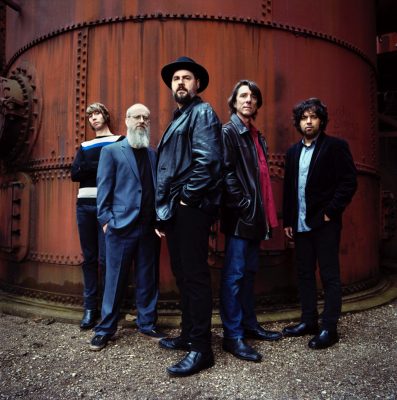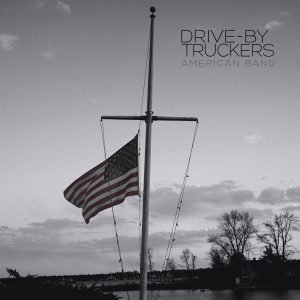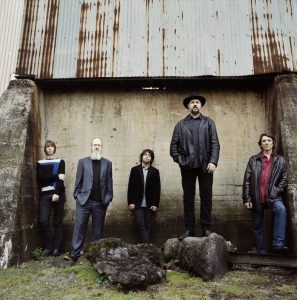
“I just got back from the gym,” Mike Cooley says with a laugh as he answers his phone. “I’m trying to get in shape because when we go out and do this, we might have to run if they try to take a swing at us.” The Drive-By Truckers have been together for 20 years, but as they go out on the road in support of their latest record, things feel a little different. Patterson Hood has described the clear, crisp American Band as a “musical reset button” but it’s the lyrics which will catch the most attention. Their 11th studio album is the most overtly political to date. The Truckers have never shied away from serious issues but have previously tackled them by wrapping their message in storytelling. American Band changes all of that. “We’ve always been political in our albums and in our songs, some more than others,” Cooley said. “But this is the first one where it’s really out there on the surface and it’s obvious what we’re talking about. Most of it before has been in the context of a story or a character. Until now. Let the backlash begin.”
The change in tone was announced in the form of ‘Surrender Under Protest’, the Cooley composition used to launch the new album in June, then followed up with Hood’s powerful ‘What It Means’, which tackles the Ferguson decision and the killing of Trayvon Martin. As soon as the songs went online, that backlash duly arrived on the band’s Facebook page. ‘White guilt’ some called the album. “Drive-By-Cashing-In-On-Black-Lives-Matter” wrote another. Some even lamented that the band were no longer “sticking to what they do best”, whatever that meant. Cooley couldn’t care less. “I’m sure it had to be pointed out to them what it’s about,” he said. “I really highly doubt the people who get that angry would have noticed it had they heard the album themselves. For every one of the angry comments or posts, there’s someone else who said, ‘Have you ever heard their music before?’ It’s all the same thing. All of a sudden you know what these people have stood for all this time. It’s just being made a little bit more obvious so they decide to be angry. If an artist decides to be political in some way and they complain about it, saying, ‘I just wish they’d keep politics out of music’, they only say that if what is being expressed goes against what they like. When some country artist writes a very pro-conservative values thing, they don’t interpret that as political. They don’t interpret it as political if it doesn’t challenge anything.”
Ahead of the album’s full release, ‘What It Means’ has been the focal point of the debate. Although written after the death of Martin, the teenager shot and killed in Florida in 2012, Hood said it was partly inspired by events much longer ago in Georgia. “The original impetus for that song was an unarmed black man who had lived across the street from me in Athens that was shot numerous times in 1995,” he said via email. “It had haunted me but I wasn’t able to write about it. Then the events, particularly Trayvon Martin, and the horrible racial climate of late inspired that song. When it hit me, I actually wrote the song in less than an hour. It was 19 years of percolation followed by an hour of actual writing.” Like Cooley, Hood is completely unapologetic for anyone who might be upset. “I’m not really looking to provoke anything but if it gets people talking and interacting then I feel only good can come out of it. We’ve always written and said what we feel and this is some of our best work,” he wrote. “We’re fiercely proud of it and stand by it. If some folks don’t like it, that’s their prerogative and there’s nothing I can do about that. Have a nice life.”

Hood and Cooley co-founded this band in 1996. The cast of characters around them has changed several times, but the driving principles have not. For years the band worked with three individual songwriters bringing their ideas to the table – Hood, Cooley and a third seat occupied at different times by Rob Malone, Jason Isbell and Shonna Tucker – but it has been Hood and Cooley alone from 2014’s English Oceans onwards. There wasn’t a discussion or a plan to write more overtly political material, but when the band got together to go over the new songs, it swiftly became apparent what they had. “Cooley, in fact kinda led the charge,” Hood wrote. “When I first wrote ‘What It Means’ I wasn’t sure how the band would feel or if I would need to do it as a solo project. Cooley meanwhile wrote ‘Ramon Casiano’ (about a 15-year-old Mexican shot and killed by future NRA leader Harlon Carter in 1931) at about the same time and we both realised that we were once again headed in similar directions.”
Upset by what he has seen in American society as the country lurches towards an ugly and divisive presidential election between Hillary Clinton and Donald Trump in November, Cooley has found inspiration after a spell of writer’s block. He had contributed only a handful of songs to 2010’s The Big To-Do and 2011’s Go-Go Boots before rediscovering his muse for English Oceans, an album that hinted at the themes to come two years later. “There were a couple of points on those earlier records where it wasn’t there for me,” he said. “There were other factors but it was frustrating and scary when you’re just not having ideas. But for the last couple of records I was able to feel pretty inspired.”
The ongoing changes he sees in America and beyond provided the fuel. “I just couldn’t turn away from it,” he added. “There’s a lot to feel optimistic about, a lot to feel positive about with the way so many things are changing in our society and worldwide but with those changes there’s going to be pushback, you’re going to get ugliness. It gives rise to demagogues, people who can exploit that fear of a changing world for their own benefit. The nastiness has gone way beyond my expectations, I was naive enough to think we may have been last of this sort of thing, but the bar has been lowered every day. I do feel like it’s a last stand of the old way. We are moving on, we always move on, but there’s always some ugliness in the process.”
There are dozens of bands who could release a record like American Band and nobody would bat an eyelid. But even if Hood has moved cross-country from his long-time home in Athens, Georgia to Portland, Oregon, these Alabama natives remain rooted in the American South, a region that will vote solidly Republican in November – just as it has done since Lyndon Johnson “signed away the South” by passing the Civil Rights Act in 1964. Hearing a strongly liberal record sung in a Southern accent is what seems to catch so many people out – at least those who haven’t been concentrating since the Truckers released their magnum opus Southern Rock Opera 15 years ago. “In a lot of what we do we keep coming back to that,” Cooley said. “We’ve done so much about the culture of the South and a lot of our goals are just trying to explain that to ourselves. It’s a complicated and confounding history. Maybe it can hit a nerve on a different level if a 50-something-year-old Southern man is saying this because I see now a description of the average Trump supporter and it’s white, middle-aged, no college education and male and I’m like, ‘That’s me’. Standing up and saying no with this record, saying we’re not all on this train, maybe it can be helpful in some way to have people like us who don’t fit the stereotype.”
Hood believes his move to Portland “opened the floodgates” in terms of his writing, and it is certainly responsible for one of the stand-out songs on the album, the heartfelt ‘Ever South’, which he describes as a “love letter and breakup song” to the place that will always be home. “I will always be Southern but right now I needed to live somewhere else,” he wrote. “It was actually the last song I wrote for the album. My family and I were all homesick but also excited about our adventure. My wife and I went to see the movie Brooklyn, which is essentially about that very thing, and I came home and wrote the first half of the song. I wrote the last part the next night. It’s probably one of my best songs.”
Upsetting fans is one thing when it comes to turning up the political volume, but you also have to make sure everyone in the band is on board too. Bass player Matt Patton, multi-instrumentalist Jay Gonzalez and drummer Brad Morgan don’t write the songs but their name is on them too when the record comes out. And it’s not just in their songs that the Truckers have been making a statement this year. They performed at a rally during the Democratic National Convention, and have played with ‘Black Lives Matter’ banners across their amplifiers.

Photo: Danny Clinch
“If you go on the same stage or release the same record, you have to own it and you have to stand by it,” Cooley said. “Nobody’s said they’re not comfortable with this. We all have our views on a lot of things and how we look at humanity, but we’re very much on the same page. Some of these things come down to asking the world around you, ‘Have you no sense of decency?’ We have very much the same values when it comes to that. Everybody was pretty excited to get behind these songs.” Hood, having admitted he first thought about making ‘What It Means’ a solo project, echoed Cooley. “I absolutely would not or could not do anything like this without the total unanimous support and agreement of the band,” he wrote. “At this point in my life, I’m not sure I’d want to play with people who had an issue with what this album is saying. Life’s too short.”
The election cycle may not have been the direct inspiration for the record, but it’s helped shape the process that followed. As soon as Hood and Cooley heard each other’s songs and recognised the nature of the album they were about to make, they shifted through the gears to speed up the recording process. “We knew what we had so we tried to move quicker than normal to get it out in time for the election and really stir the pot,” Cooley said. “We were mapping out schedules and deadlines right away to get it ready for early fall.” The recording process was completed in a blur, with nine songs cut in a three-day session at the Sound Emporium in Nashville, and the rest finished in three more days right after Christmas. “The resulting album is really live and raw yet probably has some of our most accomplished playing,” Hood wrote.
They themselves may barely have had time to notice, but the rush has proven the Truckers have all the drive and determination they had when they first got together in 1996. “It feels good to be together as a band for as long as we have,” Cooley said. “Even at the age we are we suddenly have even more vigour and passion for it, we really do. With the band playing better than we ever have and having more fun together, we’re fired up to get out and trying playing this stuff. And running for our lives if necessary.”
